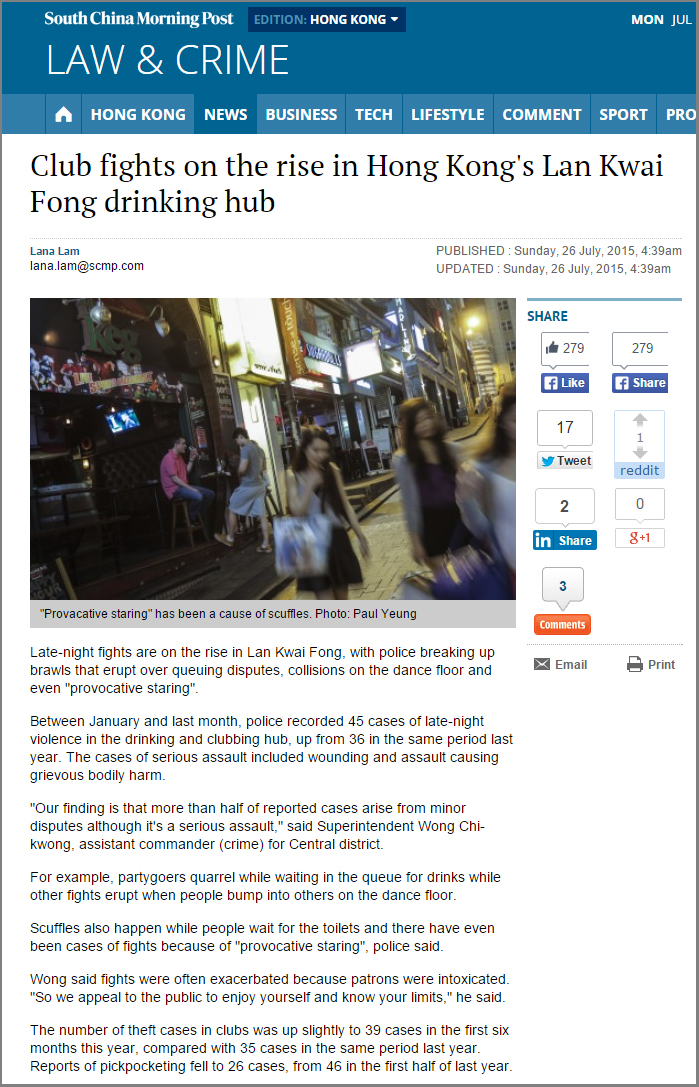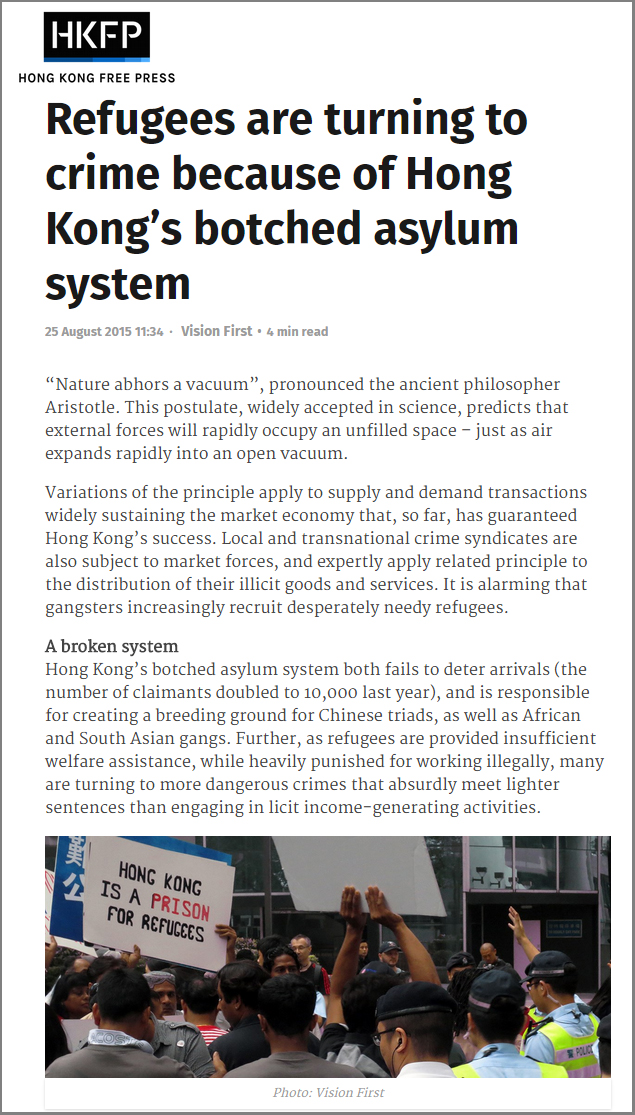Homeless refugees and locals spend nights in McDonald’s
Oct 28th, 2015 | Housing, Media, VF Opinion, Welfare | Comment
Homeless refugees, both new-arrivals and veterans, frequently spend nights in McDonald’s especially during cold winter months. Prohibited from working and inadequately supported by the Social Welfare Department, a growing number of refugees are becoming homeless and sleeping in parks, passageways and under flyer-overs. McDonald restaurants are the only establishments that offer safety and comparable tranquility overnight. Similarly to impoverished residents, refugees huddle up on benches with their few belongings after midnight and return to the street at the crack of dawn, before their presence inconveniences breakfast customers. It is disgraceful that Hong Kong Government fails to support its poorest citizens and reduces refugees to dehumanizing destitution.
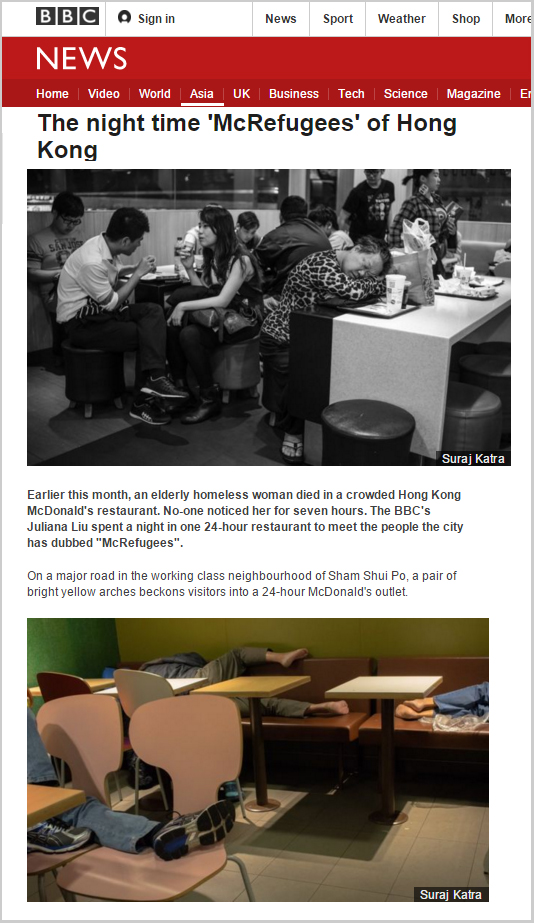
Thinking like a villager in Asia’s World City?
Oct 9th, 2015 | Advocacy, Crime, Media, Racism, VF Opinion | Comment
It is reproachable that at times persons whose opinions might be esteemed, and should thus carefully word and base statements on facts, cast judgments that verge on xenophobic intolerance, contrary to the best interest of Hong Kong. As a commentator in a local newspaper recently observed, “We often say we want to be a world Asian city, but we behave like a village”.
One example is Mr. Fung Keung’s op-ed published on 8 October in the China Daily, which contains several mistakes to say the least.
First, a rise of arrested asylum seekers from 683 to 904 in a three-year span is hardly indicative of a crime surge when contemporaneously asylum applications increased several folds to over 10,000. Comparatively, it could be argued that the crime rate among asylum seekers has decreased over the period, and indeed is quite low given that many work to support themselves. It is notorious that welfare assistance for asylum seekers is insufficient to make ends meet.
Second, that asylum seekers are arrested for crimes other than working illegally to a larger extent than before may not necessary show that asylum seekers are turning to violence. Rather it may be dependent on which crimes and who is policed in society, and related priorities of law enforcement.
Third, Fung hints that the victims “are believed to be Hong Kong citizens” and asylum seekers should not be accepted in Hong Kong because the city owes them nothing. Rather asylum seekers, when compared to Singapore, make Hong Kong dirty and unsafe, hurting citizens who would otherwise live in a peaceful environment.
Overlooking for a moment international and domestic legal obligations towards refugees, Vision First queries, does Fung really think that local citizens do not commit crimes? Who does Fung think are the employers and recruiters of asylum seekers? Who does Fung believe are the people whose behavior is learnt and with whom connections are made in local prisons by asylum seekers? Perhaps an overview of police charts would have helped Fung formulate more accurate opinions.
Fourth, it is arguable that asylum seekers borrow money from their smugglers, leaving them no choice but to commit crimes to repay such debts. This would certainly be a situation akin to trafficking, in which case Fung should be concerned of Hong Kong responsibilities in setting up a policy framework that tolerates such circumstances. In reality, research supports conclusions quite opposite to Fung’s intolerant views. Vision First would certainly appreciate if Fung agreed to disclose the research he conducted to ground such opinions. A rapid search online did not produce satisfactory results.
Fifth, Fung argues that it is “common sense” that “tells us that religious and political persecution in these countries is extremely rare”. Vision First cannot but query if the same “common sense” is used by immigration officers and adjudicator when screening asylum seekers. The increasing number of rejections being quashed by court judges, often for failure to fully appraise country of origin information, would certainly call for a revision of such unhelpful “common sense”.
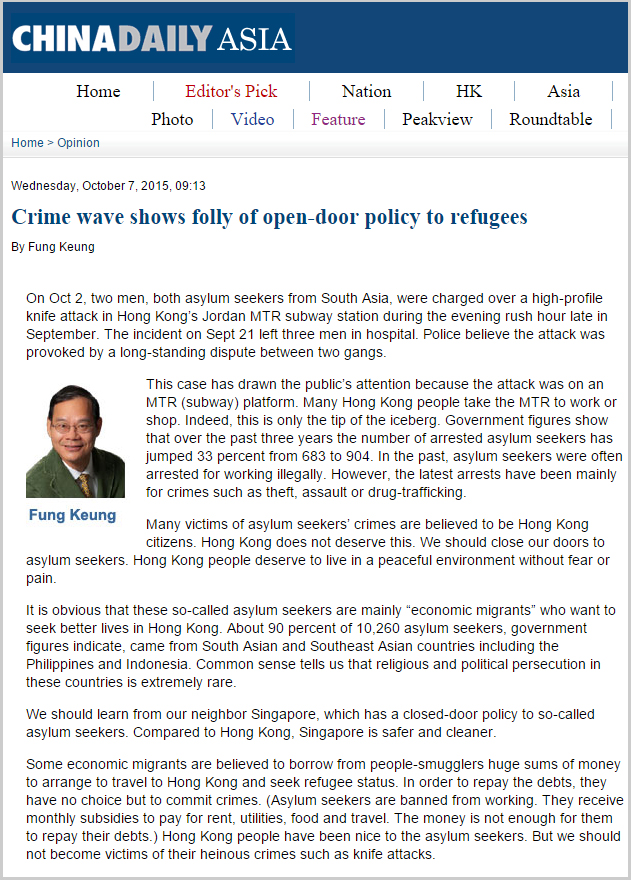
Security Bureau fails to comment on ‘cozy relationship’
Oct 7th, 2015 | Crime, Government, VF Opinion, Welfare | Comment
In reply to Vision First open letter to the Security Bureau, dated 4 July 2015
Vision First Questions:
1. Some lawyers confirm that most of their clients do not receive sufficient funds, or financial assistance in kind, or food coupons to meet their basic needs, as rents have increased and inflation has outstripped the amounts provided by SWD. This leaves refugees with no choice but to beg and frequently resort to working illegally. Is it not a fact that the increase in rents has outstripped the rental assistance provided to claimants?
2. Do you agree that thousands of asylum seekers lived for years, and hundreds continue to live, in abandoned chicken and pig farms sanctioned by the government as these were/are the only locations affordable based on government rent assistance?
3. Do you agree that such pig and chicken farms were/are not zoned for residential living? Is the government investigating why this happened and who is responsible for distributing public money to pay for illegal structures?
4. Will anyone be prosecuted for allowing dozens of refugee slums to develop and operate on funds paid from the public purse between 2006 and 2015?
Security Bureau (vague) reply:
Service users should be living in appropriate living environment. (NB: Supposedly not slums)
ISS-HK may require landlords to file supportive documents to indicate the premises’ condition.
For those assessed to be below standard, or where any illegal structures have been identified, ISS-HK would inform the service users concerned and advise them to move to another accommodation as soon as possible for the sake of their safety.
For those premises which warning letters have been issued by the Lands Department as illegal structures, ISS-HK will stop the rental payment to the landlords in the coming month.
Comment:
It is regrettably noted that the Security Bureau failed to comment on the ‘cozy relationship’ enjoyed by slum landlords who for years profitably settled refugees in makeshift huts and converted animal sheds erected on agricultural land manifestly not zoned for residential use, while ignoring the risks and dangers inherent in such questionable arrangements. Will anybody take the blame?
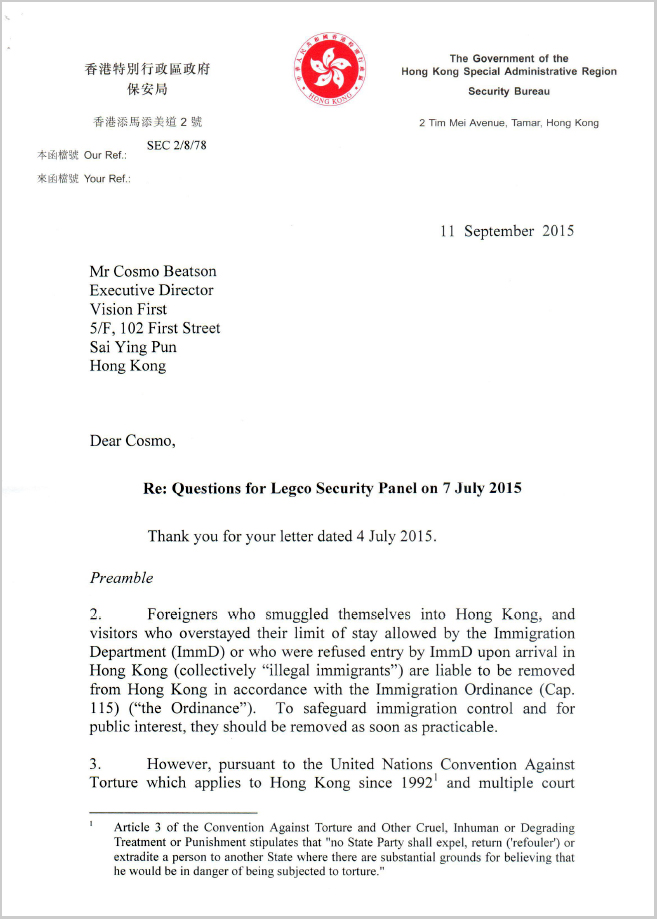
Does Hong Kong judge refugees as ‘bogus’ upon arrival?
Sep 26th, 2015 | Advocacy, Immigration, Racism, Rejection, VF Opinion | Comment
What happened to the universal and unalienable right to seek asylum?
What happened to the benefit of doubt through the assessment process?
What happened to trumpeted (but not respected) high standards of fairness?
What happened to critical thinking by media outlets?
What is happening to refugee rights in Hong Kong?
Hong Kong Government policy on seeking asylum: “According to the Secretary for Security, foreigners who smuggled themselves into Hong Kong, and visitors who overstayed their limit of stay allowed by the Immigration Department (“ImmD”) or who were refused entry by ImmD upon arrival in Hong Kong (collectively known as “illegal immigrants”) are liable to be removed from Hong Kong in accordance with the Immigration Ordinance (Cap. 115) (“the Ordinance”). To safeguard immigration control and for public interest, they should be removed as soon as practicable. However, pursuant to the United Nations Convention Against Torture which applies to Hong Kong since 1992, and multiple court rulings since 2004, ImmD cannot remove illegal immigrants to another country where they would face a genuine and personal risk of being subjected to torture, or cruel, inhuman or degrading treatment or punishment, or persecution. Moreover, the court rulings mandate that if an illegal immigrant alleges that he would face such risks upon removal to another country, he cannot be removed from Hong Kong to that country unless such risks are assessed by ImmD to be unsubstantiated under procedures which meet the high standards of fairness.”
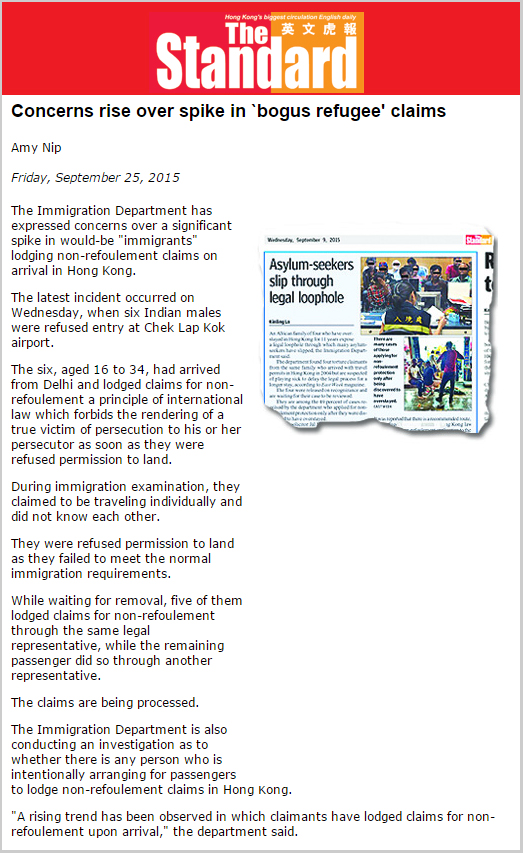
A local case of cruel, inhuman treatment and punishment?
Sep 10th, 2015 | Immigration, Medical, Rejection, VF Opinion, Welfare | Comment
In recent months the government has waged a war of words against asylum “abuse” in general and claimants arriving from India in particular.
Hong Kong might not be a city “of extraordinary compassion”, as Prime Minister David Cameron said about Britain, but crucially the High Court requires that, “a refugee claimant deserve sympathy and should not be left in a destitute state during the determination of his status. However, his basic needs such as accommodation, food, clothing and medical care are provided by the Government.”
Further, the Hong Kong Bill of Rights Ordinance unequivocally prescribes that, “No one shall be subjected to torture or the cruel, inhuman or degrading treatment or punishment” (Art. 3).
Despite such exquisite guarantees of refugee rights and government duty, in the evening of 22 August 2015, a destitute, starving, homeless and sick refugee collapsed in the streets of Jordan and was rushed unconscious by ambulance to Queen Elizabeth Hospital where he was treated for 18 days. The diagnosis was loss of consciousness, sepsis, psoriasis and alcohol dependence.
“I lost consciousness and hit my head,” recalls Singh, “Someone called an ambulance and I woke up in the hospital. I drank beer for the pain and itchiness of these sores covering all my body. It started small but got very worse [in the] six months [that] I waited for Immigration to give me new immigration paper. I had no help, no food and could not go to the clinic. For long time I sleep in the streets.”
In 2010 the Marine Police arrested Singh as he entered illegally from China. He was released from Immigration detention after lodging a torture claim based on his fear of death threats which has not yet been determined under the Unified Screening Mechanism (USM). Around May 2012 he lost his Recognizance Form 8 and stopped reporting to Immigration for fear of being deported.
A refugee friend recalls the night in March when he encountered him, “It was freezing cold. I saw a man shivering on a bench in the park. I asked where he was from and what happened. He told me he was from India. He was sick and very desperate. I offered him food and the next day I took him to the Refugee Union. Two days later I took him to Immigration to apply for a new paper.”
According to Singh and his friend, who speaks fluent English and assisted him throughout, Immigration was fully informed about Singh’ predicament and especially about his medical condition that an officer agreed “was very critical”. And yet Mr. Singh was told to wait “one or two weeks”, repeatedly, until he grew the suspicion that Immigration planned to arrest and deport him.
Ignorance of his rights exacerbated the suffering Singh endured until he lost consciousness. The asylum process however showed little sympathy and did not prevent destitution by providing essential shelter, food and, most critically, medical treatment. On one occasion Singh says, “My officer told me that if I want to go back to India they will arrange the ticket immediately.” Yet his request for a replacement Recognizance Form has been ignored since March 2015.
Queen Elizabeth Hospital compounded Singh’s ordeal by demanding $25,870 upon discharge and withholding essential medications until the bill was settled. The penniless and despairing refugee had no option but to walk out of the hospital in shame. “They told me to go to the clinic in Jordan for treatment, but first I must pay the hospital bill. How can I pay? I have no money,” he laments.
Paranoid by fears of abuse and anxious to reduce the number of asylum seekers, Hong Kong Government is waging a war of attrition against refugees with forced hardship deployed as the main weapon. This approach is deeply regrettable as the effect on asylum abusers is questionable, while the impact on the weakest refugees is obvious. The time has come for the authorities to look in a mirror and figure out why the asylum process is failing everyone – vulnerable refugees especially.
UPDATE – The day following this blog, Singh was issued with a new Recognizance Form and collected medication from Queen Elizabeth Hospital that waved all charges.
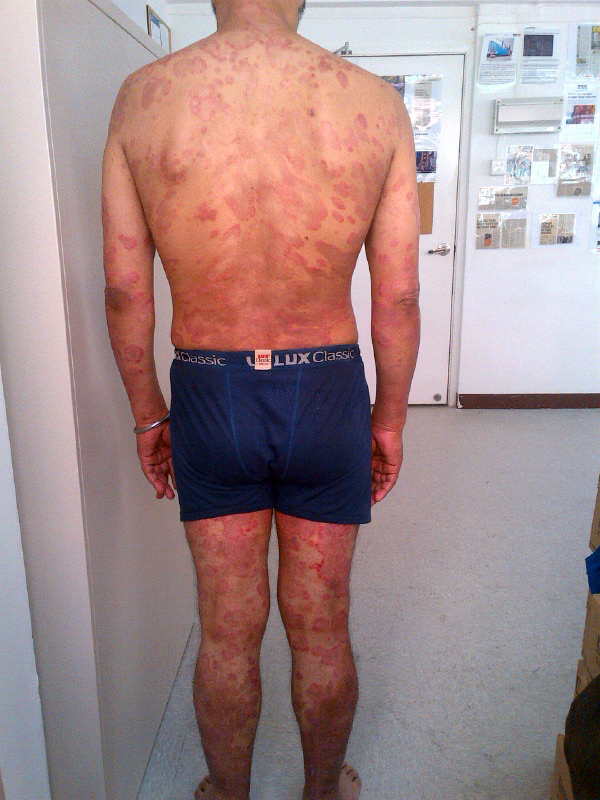
Will Hong Kong’s negligent indifference to refugees shift?
Sep 9th, 2015 | Immigration, Rejection, VF Opinion | Comment
The summer of 2015 will be remembered for the unprecedented European refugee crisis that, at the cost of more than 3000 lives, galvanized public attention, prompted alleged policy changes and caused an apparent although inconsistent and perhaps short-lived shift from apathetic indifference. “There is an enormous response from the public,” said an aid-worker in Malta, “The tide of indifference is shifting.”
Faced with extraordinary challenges, some European leaders are offering support and money they should have pledged earlier. Although the effectiveness of such emergency expenditures remains to be seen, European heads of state appear to be cognizance of the moral imperative of doing what is needed irrespective of financial cost and socio-cultural ramifications.
Chancellor Angela Merkel pledged 10 billion euro over two years to settle a record 800,000 refugees representing a one percent population growth that will profoundly impact German society. She remarked, “The fundamental right to asylum does not have a limitation. As a strong, economically healthy country, we have the strength to do what is necessary and ensure that every asylum seeker gets a fair hearing.”
After criticizing rescue operations in the Mediterranean, Prime Minister David Cameron confirmed that the UK will receive 20,000 Syrian refugees over the next five years and pledged millions of pounds to assist frontline countries in the biggest, yet repeated, refugee crisis in decades. Speaking to the House of Commons he remarked, “In doing so, we will continue to show the world that this country is a country of extraordinary compassion.”
President Francois Hollande offered 11 million euro and stated that France will take 24,000 refugees over the next two years. He urged the European Union to make a collective effort to ensure that the European ideal of open borders would continue to be respected. Facing strong right-wing opposition, Hollande wants the French to accept a shift in policy regarding migrants.
Finnish Prime Minister Juha Sipila went a step further by offering his second home to a refugee family, as he no longer used it after moving to the capital. Meanwhile a German daily ran a popular article with advice on how to take in refugees, following the lead of lawmaker Martin Patzelt who hosted an Eritrean family. Patzelt wrote on Facebook, “I am trying to do my part … by giving a home to refugees and helping them to integrate into our country.”
Meanwhile Pope Francis invited every parish, convent and monastery across Europe to open their doors to homeless refugees who are “fleeing death from war and hunger and are on the path towards a hope for life.” He remarked, “Faced with a tragedy of tens of thousands of refugees, it is not enough to say ‘Have courage, hang in there.’” And the Vatican will welcome two refugee families.
Not without a hint of hypocrisy, riding the wave of public opinion distraught by photos of a dead toddler (hardly a unique occurrence), many European leaders have sprung into action. Citizens of Austria are sending convoys of private cars to assist refugees stranded at the Hungarian border. The first arrivals in Vienna were greeted with warm meals, blankets and shopping carts of food, water and hygiene products. Spaniards have gathered in street protests urging a better reception of refugees in Spain. A demonstration is planned this Saturday in London in solidarity for refugees.
In Hong Kong however refugee discourses hinge on securitization patterns. Death is a potent wake up call for the public. Does Hong Kong need to see some toddler dying in this city’s streets to finally question Hong Kong Government’s abysmal track record. Reports reach Vision First of asylum seekers engaging in the perilous journey to cross the sea between Hong Kong and China. Like Europeans a few days ago, these travelers are called migrants, or more precisely “illegal economic immigrants”. What will it take to shift for Hong Kong’s negligent indifference to refugees?
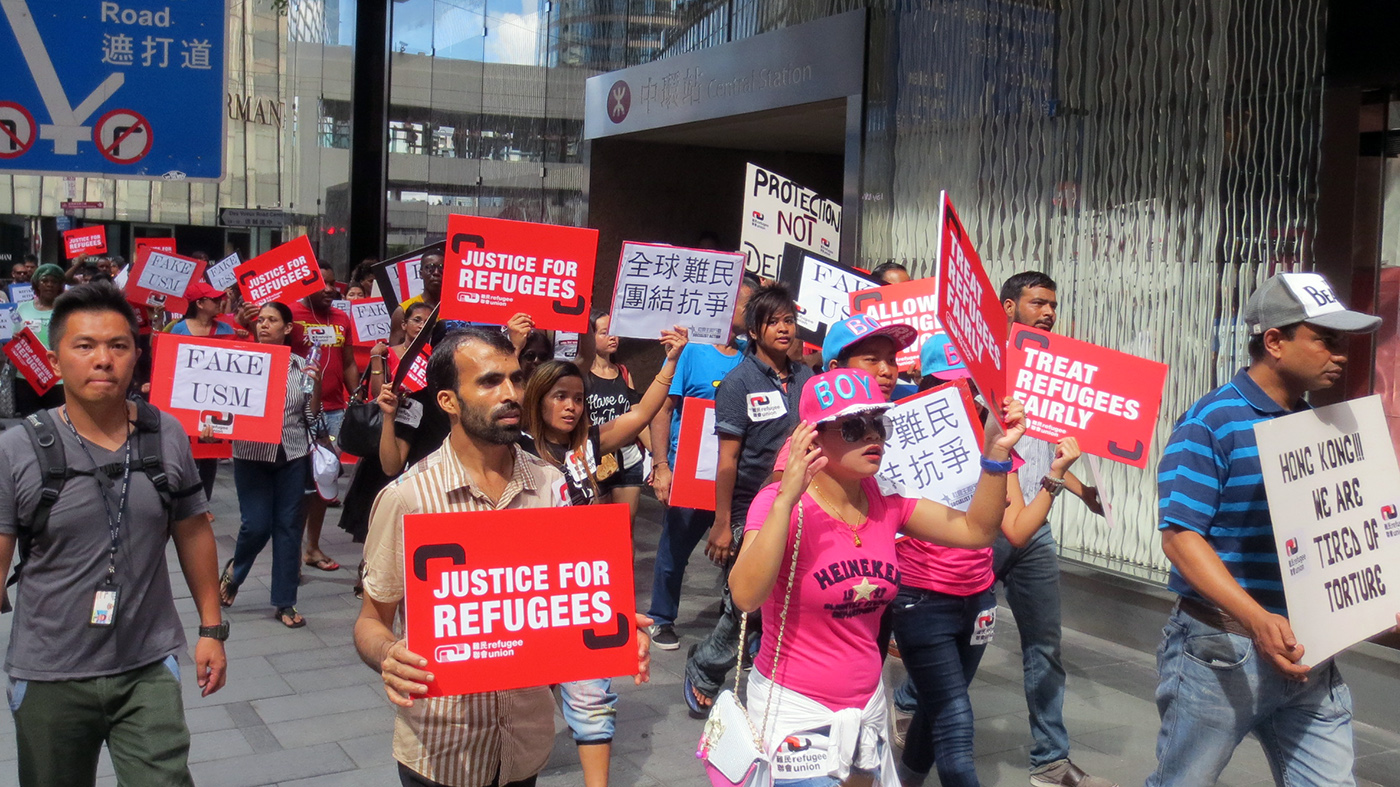
All they want to do is reject people
Sep 1st, 2015 | Immigration, Personal Experiences, Rejection, VF Opinion | Comment
“There is no chance for you to make an appeal. You should give up”, an African refugee reported being told by his duty lawyer a few weeks before withdrawing his asylum claim. According to the Standard, on top of 2237 rejected cases, 1600 claimants cancelled their asylum bid since the Unified Screening Mechanism (USM) was launched in March 2014.
Although the number of new arrivals is surging, rejection and withdrawal figures suggest that Hong Kong Government is waging a psychological war that underpins a “long established policy of not granting asylum” (Security Bureau, § 6).
The absurdity of seeking asylum in Hong Kong was a painful experience for Marku (not his real name). Without questioning his credibility, Immigration rejected his claim with the assessment that he could relocate or hide internally in his country.
Concealment in remote areas (including spider holes?) might indeed be an option for individuals fleeing persecution. However, in our experience, Immigration appears to unimaginatively and unconvincingly suggest “internal flight” and “internal relocation” as the only viable alternative when dismissing otherwise credible asylum applications.
“My lawyer said that I should go back to my country and live someplace else,” Marku reported with frustration. “He advised me not to appeal despite hearing that my country was at war and my problem is very big. He said, ‘Your immigration officer was right. He made the right decision to reject your claim.’” Marku was incredulous and had the impression that, “My lawyer just came to help Immigration to reject me!”
Marku continued, “The lawyer didn’t provide even one (COI) document that I saw. Everything I did myself. I didn’t hear him give me any advice, or suggest anything during the interviews. It was like he was not my lawyer. It was like he was one of the officers of Immigration. He did not care about me. He did not care about my case, about anything.”
States erect policy walls inside borders to discourage and deter refugees. These barriers are less sinister, yet arguably more harmful, than border fences. As Marku experienced, such impediments obstruct the course of asylum and the securing of protection, “I have proof. I have everything. I have death certificates (of family members), but they don’t care. I decided to go back because Hong Kong Government is not serious.”
Refugees bounce from interview to interview for years till 99.7% are either rejected or withdraw their claims in frustration. The trend is less indicative of abuse, than a challenge to the credibility of an ill-conceived and poorly implemented asylum system. On the flip side, in light of the “long established policy of not granting asylum”, the screen-to-reject process might be considered a resounding success.
Hong Kong’s culture of rejection hit Marku hard, “I am very disappointed. I am just wasting my time in Hong Kong for nothing. I have (many) family members who fled to (a neighbouring country) and were all recognized by the UNHCR because of my personal problems, not because of something that happened to them. I told Immigration and still they rejected my claim.”
Marku, who was allowed by Immigration to fly to a neighbouring African country, was utterly disillusioned, “All they want to do is to reject people. There is no justice in Immigration for asylum seekers and refugees. I stopped in Hong Kong for protection, because if I went home they would kill me. But now I know they don’t give protection. Now I know the USM is fake. Why should I stay? After I closed my case, Immigration wrote, ‘Your appeal and petition are dismissed on the ground that your contemplated risks are no longer in existence.’”
Is that intended to rub salt in the wound?
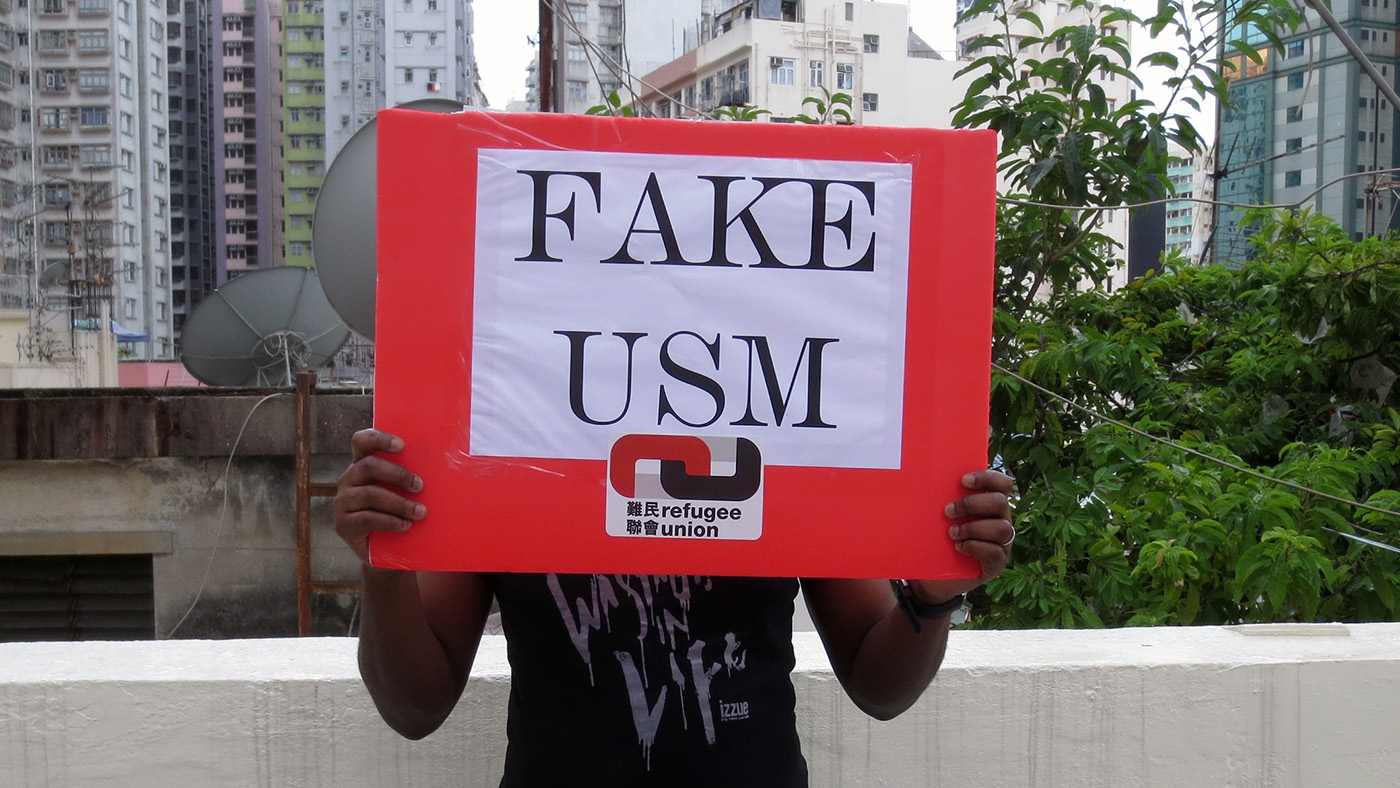
Refugees are turning to crime because of Hong Kong’s botched asylum system
Aug 25th, 2015 | Crime, Immigration, Rejection, VF Opinion, Welfare | Comment
Shedding light on a misleading government press release
Aug 5th, 2015 | Government, Immigration, Media, Rejection, VF Opinion | Comment
Government propaganda appears to be formulated to malign refugees by tossing anyone who dares to seek asylum in the “illegal immigrant” dumpster. Is the depiction of refugees as illegal immigrants justifiable? Let’s start with the facts:
On 30 July 2015, Immigration refused entry to six foreigners who landed at the Hong Kong International Airport. Three of them were Indians arriving from Delhi, while the others were a mother and two children flying from Ethiopia. After being denied entry, all six applied for asylum by raising non-refoulement claims through the Unified Screening Mechanism (USM), thus blocking removal proceedings.
A government Press Release followed the next day, reported by several media outlets including:
– Six passengers refused permission to land lodge claims for non-refoulement
– 6旅客甫抵港即提免遣返聲請入境處調查
– (TVB) 六旅客被拒入境聲請免遣返疑事先策劃
The report appears to reveal what is an alarming problem. Attention should be drawn to these statements in particular: “while waiting for removal, the legal representative (of the Indians) lodged claims”, “for the three African passengers, a non-governmental organisation had already informed ImmD”, “the African female admitted that their travel documents did not bear their genuine identities”, “all of them lodged claims soon after they had been refused permission to land”, “ImmD will conduct further investigation on whether or not there is any person who intentionally arranged … to lodge claims”.
The media presented the above information as arguably indicative of abuse. Yet, Vision First claims the above actions and information are essential to due and fair process. It is a constitutional right of individuals to seek protection against refoulement. It is not a loophole in legislation.
Further, let’s consider:
- Hong Kong welcomed more than 5 million visitors a month in 2014. As one of the busiest tourist and transit hubs in the world, it is unremarkable that on average 20 asylum seekers sought government protection at control points every month last year. Considering international migration/refugee challenges, one might ask: Why so few?
- The legal representative for the Indians should not be singled out for assisting claimants “waiting for removal”, as if the asylum process were thus abused. The lawyer was simply doing his job advising clients who requested assistance in the process of seeking asylum. The claimants were smart to hire a lawyer who should be praised for resisting and (temporarily) succeeding against the state machinery that would otherwise have probably deported his clients.
- The press release fails to report that the African husband is a mandated UNHCR refugee attempting to reunite with a family he originally separated from when he fled abroad. Immigration knew this from interviews supported by documents, yet chose to depict the “African female” as a deceitful abuser in possession of fake passports. In fact it is legally acceptable for refugees to flee to safety with any documents that will achieve that objective.
- The press release fails to report that Immigration officers refused entry to the African mother and children (boy 6, girl 5) when they sought asylum earlier this year at the SkyPier at the Hong Kong International Airport. On that occasion, the mother submitted that her husband was a UNHCR refugee in Hong Kong and they would face danger if returned to Africa. It is disconcerting that her protection pleas were ignored and the family was removed without further investigation.
- The press release avoids stating that the NGO in question was the Refugee Union, perhaps to deflect attention from the valuable assistance the society offers refugees in need of advice and communication with government departments. It is reported that the husband of the African family sought the assistance of the Refugee Union that competently liaised with Immigration and secured the release of the mother and children in two days.
- No consideration is given to the basic legal principle that any asylum claim ought to be treated as genuine until the entire screening process is concluded. The press release instead seems to presume that the 3 Indians and 3 Africans were troublesome abusers of an otherwise fair asylum process. What are persecuted foreigners expected to do if raising claims at the airport is considered reprehensible?
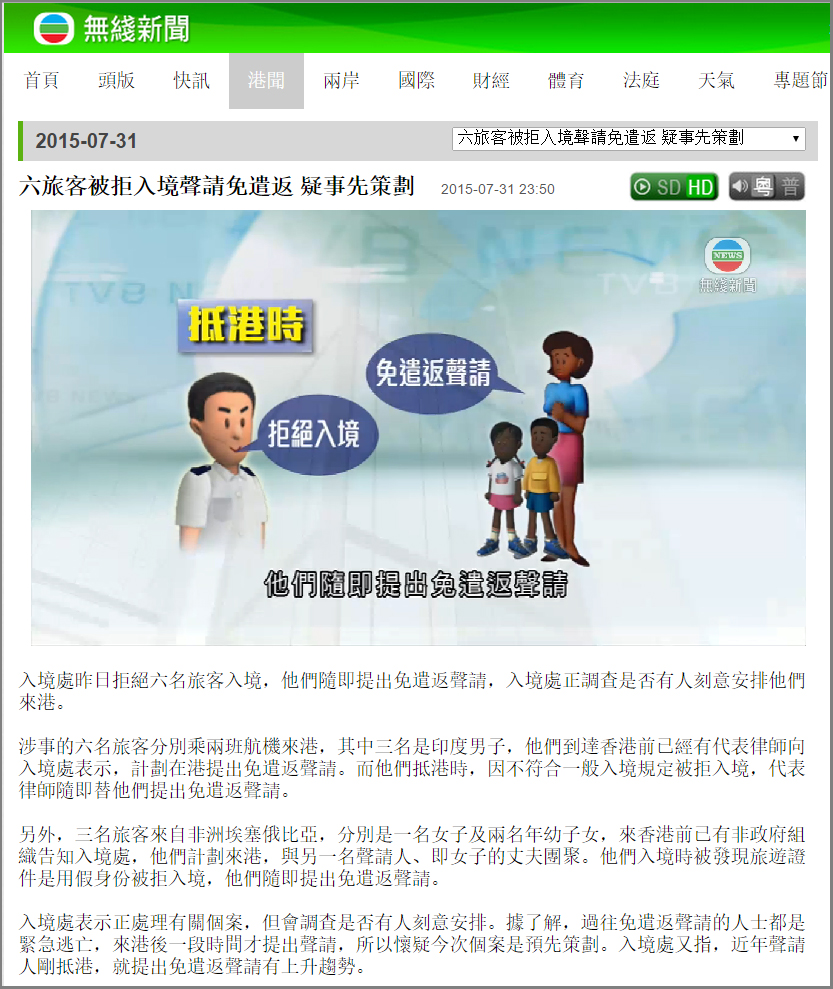
Increasing number of refugees arrested selling drugs
Jul 27th, 2015 | Media, VF Opinion | Comment
It would have added insight to include some background information, such as an asylum policy that criminalizes claimants who are not granted economic rights to make an honest living — while trapped by a welfare assistance that is insufficient. Consequently those pushing drugs are not necessarily economic migrants, but may also include refugees who made the calculation that it is better (and more profitable) to serve 3-4 months in prison for selling drugs, than 15-22 months for working illegally. As no official statistics are available it is actually difficult to say how many people are involved, but the number appears to be on the rise.
Vision First understands that since international trade is down, due to the high dollar, many refugees have considered illicit activities to survive in a hostile environment that punishes harshly those who engage in ‘legal work’. The fundamental issues have not changed: refugees cannot work and are stranded in Hong Kong for many years with limited assistance. They strategize accordingly. And obviously there are those who take advantage of their desperate precariousness to hire them for criminal activities. This article fails to mention the syndicate bosses who exploit some of the most marginalized and destitute people in society left with no legal way forward.
Finally, refugees constrained by protracted destitution are not immune from the lure of crime, especially if they feels that society and the rule of law have turned against them. And we will all pay the price for it, directly or indirectly. We should seriously question the notion that we can advance ourselves by leaving the disadvantaged behind or by trampling on their human rights.
